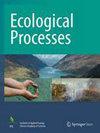Peri-urban dynamics: assessing expansion patterns and influencing factors
IF 3.9
2区 环境科学与生态学
Q1 ECOLOGY
引用次数: 0
Abstract
Peri-urbanization, the expansion of large metropolitan centers into adjacent peri-urban regions, is a growing concern due to land scarcity and escalating housing costs. These zones, a blend of rural and urban features, blur the line between urban and rural areas, creating new landscapes. This study examines historical, present, and potential growth trends in the peri-urban area surrounding Durgapur Municipal Corporation (DMC). Analytical techniques and spatial metrics are used to track development intensity changes over time, including built-up density, Shannon’s entropy, Landscape expansion index, Average Weighted Mean Expansion Index, Annual Built-Up Expansion Rate, Built-Up Expansion Intensity Index, and Built-Up Expansion Difference Index. Landscape indices like Patch Density, Edge Density, Landscape Shape Index, Largest Patch Index, Ratio of Open Space, and Area Weighted Mean Patch Fractal are used to understand fragmentation, connectivity, and spatial relationships. The Logistic Regression Model (LRM) is used to identify influencing factors and CA-Markov modeling for future built-up areas. Between 1991 and 2001, built-up area in the region increased significantly, primarily due to urban development near industrial zones, roadways, and mining areas. The growth was primarily concentrated in the western sector and near National Highway-2 (NH-2). Urban sprawl was a continuous trend, with the highest built-up density in the South-South-East (SSE) direction from 1991 to 2011. Additionally, a key determinant of built-up development was the distance to the city core. By 2031, the built-up area is expected to concentrate in the western and southeast regions, reaching 177.90 km2. This expansion is attributed to urban development near industrial zones, roadways, mining areas, and other infrastructure. The study identifies distance to the city center as a significant influencing factor for built-up development. The results emphasize the need for inclusive urban planning methods prioritizing sustainable development principles and prudent resource management for future growth and efficient management in the DMC’s peri-urban area.城郊动态:评估扩张模式和影响因素
由于土地稀缺和住房成本上升,近郊城市化,即大都市中心向邻近近郊区域的扩张,日益受到人们的关注。这些区域融合了农村和城市的特点,模糊了城市和农村的界限,创造了新的景观。本研究探讨了杜尔加布尔市政公司(DMC)周边城郊地区的历史、现状和潜在增长趋势。采用分析技术和空间度量来跟踪开发强度随时间的变化,包括建筑密度、香农熵、景观扩展指数、平均加权平均扩展指数、年建筑扩展率、建筑扩展强度指数和建筑扩展差异指数。斑块密度、边缘密度、景观形状指数、最大斑块指数、开放空间比率和面积加权平均斑块分形等景观指数用于了解破碎化、连通性和空间关系。逻辑回归模型(LRM)用于确定影响因素,CA-马尔科夫模型用于确定未来建成区。1991 年至 2001 年期间,该地区的建成区面积大幅增加,主要原因是工业区、公路和采矿区附近的城市发展。增长主要集中在西部地区和 2 号国道(NH-2)附近。城市扩张是一个持续的趋势,从 1991 年到 2011 年,建筑密度最高的方向是南-南-东(SSE)方向。此外,决定建成区发展的一个关键因素是与城市核心的距离。到 2031 年,建成区面积预计将集中在西部和东南部地区,达到 177.90 平方公里。这种扩张归因于工业区、公路、矿区和其他基础设施附近的城市发展。研究发现,与城市中心的距离是城市建设发展的重要影响因素。研究结果强调,有必要采用包容性的城市规划方法,优先考虑可持续发展原则和审慎的资源管理,以促进未来的增长和有效管理 DMC 的城郊地区。
本文章由计算机程序翻译,如有差异,请以英文原文为准。
求助全文
约1分钟内获得全文
求助全文
来源期刊

Ecological Processes
Environmental Science-Ecological Modeling
CiteScore
8.50
自引率
4.20%
发文量
64
审稿时长
13 weeks
期刊介绍:
Ecological Processes is an international, peer-reviewed, open access journal devoted to quality publications in ecological studies with a focus on the underlying processes responsible for the dynamics and functions of ecological systems at multiple spatial and temporal scales. The journal welcomes manuscripts on techniques, approaches, concepts, models, reviews, syntheses, short communications and applied research for advancing our knowledge and capability toward sustainability of ecosystems and the environment. Integrations of ecological and socio-economic processes are strongly encouraged.
 求助内容:
求助内容: 应助结果提醒方式:
应助结果提醒方式:


